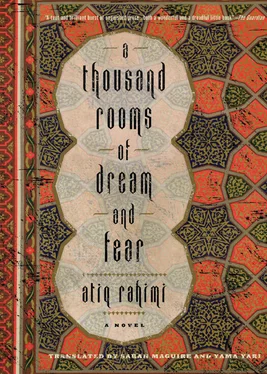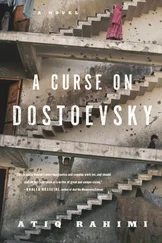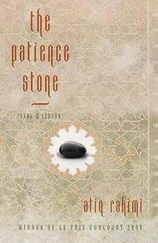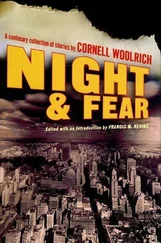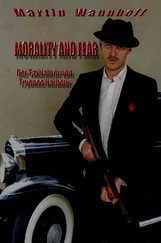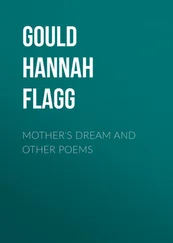Under her gaze, once again, I feel like a child — small and pitiful.
“You want to go — go then! But take great care the soldiers never find out that I took you in.”
I abandon my mother behind our door. I let her recite her prayers as many times as the stars she counts in the sky with her mouth enclosed in its brackets.
Like a naughty boy, my eyes fixed on the ground, I turn back to the terrace. I don’t dare look at the fingers that gather the hair from the side of the woman’s face to tuck it behind her ear.
I freeze at the door to the corridor.
“Sister …”
“Mahnaz. My name is Mahnaz. I hate being called ‘Sister.’ And you — what’s your name?”
“Farhad … I just wanted to say that I have no desire to put your life in danger …”
“At the moment it’s far more dangerous for me if you leave than if you stay. We will find a way tomorrow.”
I walk back down the corridor. I take my shoes off. I enter the room I just left.
Night deals with the candle.
If mine doesn’t stand up
If yours doesn’t stand up
If his doesn’t stand up
Then who will fuck the mothers of our nation?
Enayat condemned himself to exile with this variation on a favorite theme of the Communist Party. He’d written his little ditty on a scrap of paper that he folded in four and then tossed to me in class. Of course, it landed at the feet of a Communist-Party student who, of course, read it — and immediately recognized Enayat’s handwriting.
Before the lecture had finished, Enayat was gone from the campus.
That night I went around to his house. My best friend had decided to flee the country.
We spent the next two nights together, saying farewell to Kabul. It was to be a very poetic farewell. We got drunk on both nights. We slept not a wink.
Enayat had wanted me to be at his side for his last Kabul sunrise. At the moment when night finally dies under the boots of the night-watchman, and dreams are interrupted by the mullah’s call to prayer, Enayat and I were lost in the vineyards of Bagh-e-Bala. Waiting for sunup had made us thirsty, so Enayat drank dew from the leaves of each vine. Enayat was no poet, but he knew how to behave in true poetic fashion.
After the sun rose, we went back home and drank yet more wine. When our wine ran out, we returned to Moalem’s shop, in search of the Daughters of the Vine.
The night has consumed all but the stub of the candle. Mechanically I move my hand toward the flame. If it burns me, I’ll know I’m awake.
None of this really makes any sense. Maybe because I don’t want it to make any sense. Maybe because I’d rather I were having a nightmare than living my life.
My little finger hurts.
I wish that Mahnaz — for all her extraordinary kindness and generosity — were merely a dream. I wish that when I opened my eyes, I’d find myself in my room at home, watching dawn break on my mother’s lined face as she whispers a prayer above my head, while she wafts the fresh morning air over me … I wish she were holding me tight …
She holds us both in her arms, Farid and me. We’re both very small. Farid cries out:
“Father! Father!”
Who’s he calling “Father”? Me?
“No Farid, it’s me! I’m your brother!”
Farid won’t listen. He continues sobbing. My mother takes out her breasts and pushes a nipple into each of our mouths. Without saying a word. Farid begins to suck at my mother’s breast, but then he pulls back. His mouth is filled with blood. I stare at my mother’s breast. Instead of milk, blood spurts out. But I still suck her other breast. There is no smell of blood. Only the smell of milk. But it’s milk that’s gone off! I turn away from my mother’s breast. Sour milk surges up my throat into my mouth.
“Mother, Father is being sick again!” Farid shouts.
The smell of vomit overwhelms me. Then I see Yahya standing in front of me. He jumps up and heads down the corridor calling to his mother.
“Mother, Father is throwing up!”
Mahnaz appears at the door with a cloth in her hand. She sits down next to me and puts the damp cloth on my forehead. After a huge effort — using all the power I no longer possess — I manage to move myself. Mahnaz helps me sit up. The shirt that must have belonged either to Mahnaz’s mute, damaged brother or to her murdered husband is covered with vomit. She dabs my mouth and face clean. I avoid her eyes. I have the impression her breasts are uncovered. I fix my gaze on her hands, hands that with such tenderness gently wipe my face and neck.
“Do you feel a little better now?”
“Yes …”

Both of them are so sweet and kind! What do they want from me?
Yahya hands me a glass of water and sits down before me.
“Are you all right, Father?”
“Yahya, leave Farhad alone! Go into the other room!”
Mahnaz cleans up my vomit from the carpet. I should help her. But I can’t. The child gets up and leaves the room. I want to say something. But my tongue is heavy. I am still staring at Mahnaz’s hands. My heart beats more fiercely than ever. It pounds with utter exhaustion, it thumps with things unsaid … Mahnaz stands up.
“The curfew is over. I’ll go and get you some medicine.”
“Please don’t go to any trouble … Really, I’ll be fine …”
Mahnaz leaves the room.
Morning waits outside the window. It waits for the curtains to be drawn so it can slip into this room where I am waiting.
I will not draw back those curtains.
Daylight streams through the gap between the curtains, spilling onto the windowsill and down over the cushion that I’m sitting on, illuminating the black patterns woven into the deep red pile of the carpet. Mahnaz has gone out to get some bread for breakfast, and some medicine for me. Yahya sits on the cushion by the door. We both are silent. The child’s trusting face mocks me. He doesn’t look anything like me! Actually, he looks nothing like his mother, either. Which means he must take after his father. But, if that’s the case, why would he mistake me for him?
I trawl the blank white walls of the room searching for a photograph of his father. On the windowsill, next to the candle stub, are two large books with gold inlaid covers. I take down both of them. One is Haft Paikar and the other Khosraw & Sheerin . I put them back on the windowsill.
Why does Yahya call me “Father”? Mahnaz never answered my question. Maybe he’s never seen his father.
I call him over to me. He springs up with excitement and sits down in front of me, right in the middle of the sunbeam that falls onto the carpet through the gap between the curtains. He looks at me intently, unquestioningly. Yet the mind of a child like Yahya should be full of questions, particularly for someone he calls “Father!” A father who’s been missing for ages and has suddenly come back beaten to a pulp! Last night he asked me only one question—“Father, where have you been?”—and he did not wait for my answer. He left. It was a question without a question mark. He didn’t even repeat it. But I’ll be gone in a short while. He needs to understand that I’m not his father, that I’ll be going away, that …
“Yahya, I …”
The child moves his right eye out of the sunbeam. A constant smile on his face. Nothing in the way he looks at me gives me any impression that he’s eager for me to continue. On the contrary, he looks at me as though there’s an entirely different conversation going on inside his head: “For heaven’s sake, please leave me to my imagination. I know you’re not my father. But can’t we pretend for a while? Just as you want to imagine that everything that’s happened here is nothing other than a terrible nightmare, I need to inhabit the dream that my father has returned. Please don’t spoil it!”
Читать дальше
